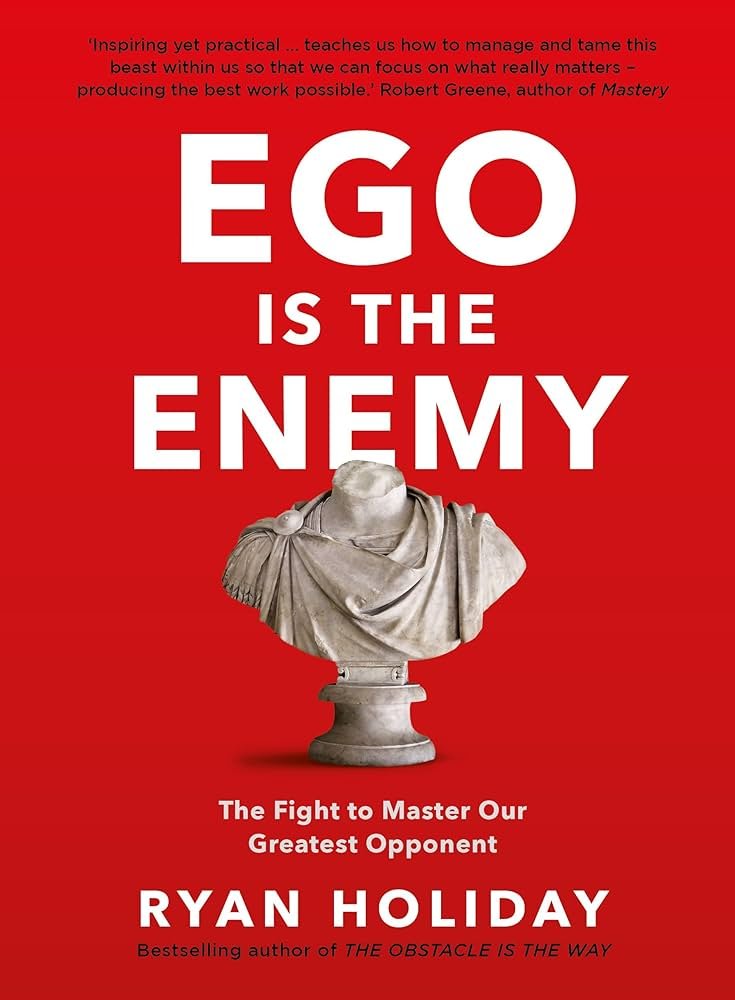
In-Depth Book Summary: “The Ego is the Enemy” by Ryan Holiday
Ryan Holiday’s “The Ego is the Enemy” is a profound exploration of how our greatest challenges often stem not from external circumstances but from within, specifically, from our own ego. Ego, as Holiday defines it, is an unhealthy belief in our own importance that blinds us to reality, distorts our self-image, and leads us down a path of overconfidence, arrogance, and ultimately, failure. Through a careful examination of historical figures, contemporary examples, and timeless philosophy, Holiday illustrates how ego can undermine ambition, stifle creativity, and destroy personal and professional relationships.
Understanding Ego: The Root of Our Problems
Holiday begins by explaining that ego is not simply confidence or self-assuredness. Confidence is earned through effort and competence, while ego is an inflated sense of self that lacks foundation. Ego whispers to us that we are better than we really are, that we deserve more than we do, and that our ideas are flawless. It’s the voice that encourages us to take shortcuts, to seek recognition before we’ve done the work, and to lash out at anyone who questions our abilities.
This inflated sense of self is particularly dangerous because it prevents us from seeing reality clearly. When we are guided by ego, we become disconnected from the truth about ourselves, our abilities, and our relationships. We lose our capacity for self-improvement because we believe we have nothing left to learn. We become vulnerable to the very failures we sought to avoid.
The Three Stages of Life: Aspire, Success, Failure
Holiday structures his book around three key stages in life, aspiration, success, and failure, each of which presents unique challenges related to ego.
1. Aspire: The Perils of Ambition
In the early stages of our careers or personal goals, we aspire to achieve greatness. We have dreams, ambitions, and a vision for what we want to become. However, this is also the stage where ego can begin to sabotage us. When driven by ego, we start to believe that we deserve success without putting in the necessary work. We become obsessed with the idea of recognition rather than focusing on the process that leads to true achievement.
For example, a young professional may become fixated on the title or status they want to achieve, rather than on developing the skills and experience needed to earn that position. They might seek shortcuts, try to network their way to the top, or focus on appearing successful rather than actually becoming competent. This obsession with outward success can lead to burnout, frustration, and ultimately, failure.
Holiday emphasizes the importance of humility during this stage. Instead of being consumed by the desire for recognition, we should focus on learning, self-improvement, and doing the work that will eventually lead to success. Aspiration should be about becoming better, not about being perceived as better.
2. Success: The Dangers of Complacency
Once we achieve success, ego becomes even more dangerous. Success can make us complacent, convinced that we are infallible and above criticism. This is the stage where many people fall into the trap of believing their own hype. We start to think that our success is a result of our inherent greatness rather than the hard work, discipline, and support that got us there. This overconfidence can lead to poor decision-making, arrogance, and alienation from those who helped us succeed.
Holiday provides several historical examples to illustrate this point. One such example is the story of General George McClellan, a Union general during the American Civil War. McClellan was appointed to lead the Union Army because of his early successes and his ability to inspire his troops. However, his ego quickly became his downfall. He became convinced of his own superiority, disregarded advice, and refused to engage in battle unless the conditions were perfect. His overconfidence and refusal to act ultimately led to his removal from command.
In contrast, Holiday highlights the story of Katharine Graham, the publisher of The Washington Post. Despite the pressures of her position, Graham remained humble, sought advice, and made decisions based on logic and ethics rather than personal pride. Her ability to keep her ego in check allowed her to guide the newspaper through one of the most challenging periods in its history, including the publication of the Pentagon Papers and the Watergate scandal.
Holiday’s message is clear: Success should not be an excuse to rest on our laurels. It’s a time to remain grounded, continue learning, and avoid the pitfalls of arrogance. We must remember that success is often fleeting, and it requires constant effort to maintain.
3. Failure: The Ego’s Greatest Test
Failure is an inevitable part of life, and how we handle it is crucial. Ego can make failure devastating, as it’s difficult to accept that we’re not as perfect as we believed. When ego is involved, failure becomes a personal attack on our self-worth rather than a learning experience. This can lead to denial, blaming others, or giving up entirely.
Holiday argues that failure is often the best opportunity to learn and grow, if we can set our ego aside. He shares the story of John DeLorean, an automotive engineer who founded the DeLorean Motor Company. DeLorean’s ego led him to believe that he could single-handedly revolutionize the auto industry, but his refusal to listen to advice or adapt to changing circumstances led to the company’s collapse. Instead of learning from his mistakes, DeLorean became embroiled in scandal and legal troubles, ultimately ruining his reputation.
On the other hand, Holiday discusses how failure can be a catalyst for growth. He points to Steve Jobs, who was famously ousted from Apple, the company he co-founded. Instead of being consumed by his ego and giving up, Jobs used the experience to reflect, learn, and ultimately return to Apple with a new perspective. His second stint at Apple led to the company’s most innovative and successful period.
Holiday advises that in failure, we must practice resilience, learn from our mistakes, and use the experience to grow stronger. Ego should not prevent us from bouncing back. Failure is not the end—it’s an opportunity to start anew with greater wisdom and humility.
The Perils of Ego: Case Studies and Examples
Throughout “The Ego is the Enemy,” Holiday provides numerous examples from history and contemporary life to illustrate the dangers of ego:
- Howard Hughes: The famous aviator, filmmaker, and businessman Howard Hughes serves as a cautionary tale of how unchecked ego can destroy even the most brilliant minds. Hughes was a man of immense talent and ambition, but his ego led him to isolate himself, make increasingly erratic decisions, and ultimately descend into paranoia and madness. His story is a stark reminder of how ego can lead to self-destruction.
- Pat Riley: The legendary basketball coach Pat Riley experienced both the benefits and dangers of ego. Early in his career, Riley’s ego drove him to success, leading the Los Angeles Lakers to multiple championships. However, as his success grew, so did his ego. Riley became fixated on maintaining his image as a “winner,” leading to tension with players, poor decision-making, and eventually, his resignation. Riley later reflected on how his ego had nearly derailed his career and made a conscious effort to stay humble and focused on the work.
- Angela Merkel: Holiday also discusses German Chancellor Angela Merkel as an example of a leader who kept her ego in check. Merkel is known for her pragmatic, unassuming approach to leadership. She consistently prioritized the needs of her country over her personal image, avoiding the grandiosity that often accompanies political power. Her ability to stay grounded and avoid the trappings of ego allowed her to lead Germany through multiple crises and maintain a strong, steady hand in European politics.
Overcoming Ego: Strategies for Success
Holiday offers several strategies for overcoming ego, emphasizing that it is an ongoing process rather than a one-time effort:
- Practice Humility: Humility is the antidote to ego. By constantly reminding ourselves that we are not above anyone else, we can keep our ego in check. This means seeking feedback, listening to others, and being willing to admit when we’re wrong. Humility allows us to stay open to learning and growth, even when we achieve success.
- Focus on the Work, Not the Recognition: Ego thrives on external validation, awards, titles, and public recognition. To combat this, Holiday advises shifting our focus from seeking recognition to the intrinsic value of the work itself. When we concentrate on doing the best job possible, rather than chasing accolades, we are less likely to be swayed by ego.
- Embrace Lifelong Learning: No matter how successful we become, there is always more to learn. Holiday emphasizes the importance of staying curious, seeking out new knowledge, and never assuming we have all the answers. Lifelong learning keeps us humble and prevents us from becoming complacent.
- Cultivate Resilience: Resilience is the ability to bounce back from setbacks, and it is essential for overcoming ego. When we fail, our ego may try to convince us that it’s the end of the road. However, by cultivating resilience, we can view failure as a temporary setback and an opportunity to grow. Resilience allows us to keep moving forward, even in the face of adversity.
- Seek Mentorship and Guidance: One way to keep ego in check is by surrounding ourselves with mentors and advisors who can offer honest feedback and guidance. Mentors can help us stay grounded, challenge our assumptions, and provide perspective that we might miss on our own. By actively seeking out mentorship, we demonstrate humility and a commitment to continuous improvement.
- Practice Mindfulness: Mindfulness is the practice of being fully present in the moment, without judgment. It allows us to observe our thoughts and emotions without being controlled by them. By practicing mindfulness, we can become more aware of when ego is influencing our behavior and take steps to address it before it leads to negative outcomes
Let’s Keep the Growth Going
You’ve come this far for a reason. Stay connected and receive insights that meet you where you are—right in your inbox.
- Join our Newsletter -
Share:




